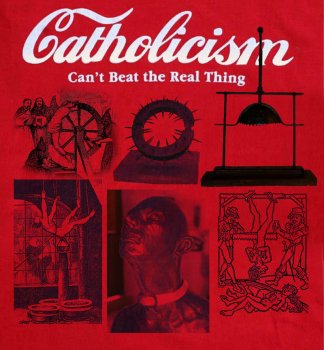I can agree.
Please keep in mind, we do not deny that the Church is also a spiritual-invisible reality, nor do we assert that salvation is strictly predicated only of those who are formally part of the physical Church structure - although we confess such an arrangement to be normative. In emphasizing the physical-institutional aspect of the Church, we do not mean to deny the invisible. Rather, as Christ Himself was both God and man, divine and human, so the Church, too, is a kind of incarnation, divine and supernatural while also physical and institutional.
Matt. 16:17-19
As Catholics we are extremely used to citing this passage in context of discussions about the primacy of St. Peter and the prerogatives of the papal office. However, we often overlook the broader implications of the verse: the establishment of a visible hierarchy. When Jesus Christ institutes His Church, He institutes a physical authority structure that will govern that Church. This verse should be read in parallel with Luke 10:16, when Christ says to all the Apostles,
"Whoever hears you hears me, and whoever hears me hears Him who sent me." The point is Jesus establishes His Church not just to preach, but to have a real authority, the very authority with which Christ is sent by the Father. This is why the Apostles, always in union with Peter, have the duty not only to preach but also the authority to bind and loose.
In short, a Church with authority to bind and loose must have a physical presence; an amorphous, spiritual communion of all believers might be able to preach,
but not bind and loose. This 'spiritual Church' model does not fit very well with our Lord's description of the powers the Church is to have. This is why Protestants have traditionally struggled with these verses about binding and loosing; once we presume that the Church is purely spiritual, "binding and loosing" can only have a spiritualized meaning, which is why many Protestants interpret this verse to mean that individual believers have authority to "bind" evil spirits in the name of Jesus. This makes little sense for a few reasons:
First, it makes sense why one would "bind" and evil spirit, but when would you ever need to "loosen" one?
Second, "binding and loosing" in the rabbinical jargon Jesus is using always refers to the binding and loosing of the faithful to certain disciplines, never to spiritual powers.
Third, Jesus says whatsoever you bind "on earth" shall be bound in heaven;
he is not referring to the spirit world, but to the world of men.
The traditional understanding, that the power of binding and loosing refers to the authority of the Church's legitimate pastors to bind believers in matters of dogma and discipline, fits the passage much better. Because this binding and loosing is also "bound in heaven", it is authoritative - and only a physically constituted authority structure can bind and loose authoritatively.
Otherwise, we are left with mere opinion and interpretation.
"He that hears you, hears me; and he that despises you, despises me; and he that despises me, despises him that sent me" (Luke 10:16).
Like the passage about binding and loosing, this passage denotes that the preaching of the Apostles is authoritative. To hear the Apostles is to hear Christ; the preaching of the Apostles is the agency through which faith in Christ is born.
"And not for them only do I pray, but for them also who through their word shall believe in me" (John 17:20); St. Paul says the same,
"Faith then comes by hearing; and hearing by the word of God" (Rom. 10:17). The word of the Apostles is life-giving; not only this, but despising the message means despising Christ, and thus God the Father. Jesus do
not say,"He who does not believe the Scriptures despises me", but "He who despises
you despises me." The message comes with authority. An invisible Church - a loose spiritual communion of Christians with diverse beliefs about everything from baptism to salvation to the Rapture to the morality of contraception -
cannot preach an authoritative message. There is no common witness. Only a message coming from something that has an institutional nature can possess this kind of authority.
Matthew 18:15-17
The Church must have a visible structure in order for someone to "
tell it to the Church." It could be argued that this simply means to take the problem to the community, but that it says nothing about the nature or structure of that community. We could respond by noting the authority our Lord gives to that community.
"If he refuses to listen even to the Church, let him be to you as a Gentile and tax collector." Our Lord expresses a kind of disbelief that someone would refuse to listen to the Church and proscribes a kind of excommunication if they refuse their obedience.
A loose spiritual communion cannot command this kind of obedience. The proscription for shunning, "
let him be to you as a Gentile and a tax collector", would make no sense in such a spiritual communion because a person who did not like the judgment of one "church" could just go down the road to another that would give him a favorable judgment. The authority Jesus invests in the Church is meaningless unless there is one Church and unless it has some sort of physical constitution.
John 17:20-21
read more here


